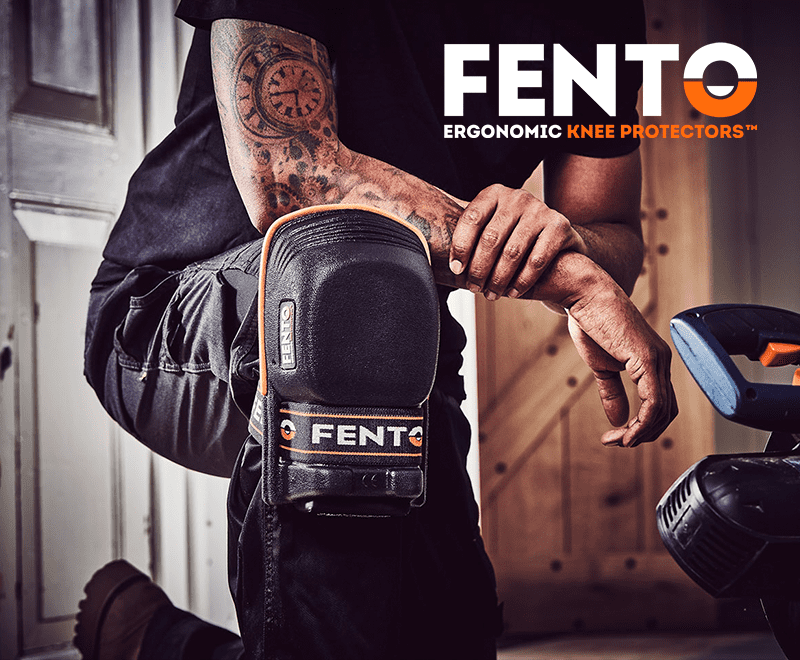Ace Tiling appeared in TSJ earlier this year as the contractor for an installation at Dodmoor House, a beautiful countryside wedding venue in Northamptonshire. Recently, we got in touch with Sam Iland, the company’s director, to learn more about his journey in the industry, the importance of training, and always expanding your offering.
Like many, Sam Iland’s path into the industry was more a matter of chance than planning. At 17 years old, a business partner of his then-employer jokingly told him: “Come and see me when you want a real job,” and sure enough, Iland did just that. On his first day, his new boss – a contractor – proposed a few different trades before simply asking him: “Do you wanna try tiling?”
“He chucked me with a bunch of guys and we went up and down the country, refurbing health clubs, swimming pools, steam rooms, changing rooms,” Iland recalls. While this sounds like a daunting introduction for someone entirely fresh to the profession, these large-scale, six week jobs were invaluable in helping him learn the ropes. “You were there to do it from start to finish, which was really good, because we’d do everything from rip out, to all the prep work, through to retiling.” In this way, although he was primarily focused on the tiling, Iland was able to gain a broad understanding of several trades at once.
(Nowadays, Iland admits that while he had always assumed they were prepping and tiling correctly during those jobs: “We probably weren’t!” He notes with some satisfaction though that with Ace Tiling, he is occasionally contracted still by that original company, and always finds those previous jobs looking and performing well 15 years later.)
Unfortunately, the travelling involved in that role meant Iland was away from home every other week, and he ultimately decided to change career and even move industries. Despite that, he always maintained an interest in tiling, helping out family and friends in his spare time, “just to keep in it,” and soon enough, Iland realised he wasn’t quite done with tiling as a career yet. “Eventually I decided: I know how to do it, I enjoy doing it, and I enjoy the end result. So I set up on my own as a sole trader.”
This lasted a few years, mostly focusing on the lower end domestic market. “Just kitchen splashbacks, basic bathrooms, but obviously your skillset and confidence and experience grows quite rapidly, because you’re forced to overcome issues and deal with different types of people.”
Once again, Iland had jumped in at the deep end, and once again it paid off.
From there, he set up Ace Tiling as a company and found his business beginning to grow. With growth, however, came growing pains. To help him manage the increasing workload, Iland started to take on other employees. “I’ve had quite a few to be fair. Anything from people with zero experience to full-blown subcontractors who have their own teams on the larger jobs.” Of course, it was always useful having an extra pair of hands, but often he found the younger school-leavers just didn’t want to be there, or spent the entire time looking at their phone, or couldn’t even get out of bed in the morning.
Iland did his best to help these initial employees, training them on the job and offering support any time they asked, but unfortunately, he couldn’t justify the cost based on the return he was seeing. “In my head, if I can get them to a stage where they can do a job on their own, their confidence will grow and eventually they’ll get to a point where they can start earning me money. So I was always pushing it, but it never really worked out.”
He hasn’t ruled out the possibility of taking on apprentices or younger employees in the future (in fact, he says there’s “no doubt it’ll happen again”) but he wants the company to reach its next phase of development before putting too much work into more recruitment now. Importantly, Iland still absolutely advocates for young people to join the industry if they’re interested. “There are some really talented people who maybe aren’t as academic, but you don’t need as much academic skills if you’ve got a good eye for deail, and you’re willing to work something out, or try and ask questions, you’ll certainly get there.”
Luckily, Iland had one contact from his old job who he knew would be a perfect fit for the team, and after four years of constant effort, managed to convince him to join the company. “That was three years ago, and it’s been the best thing I’ve done,” Iland says. “Now we know how each other work, we don’t even need to talk sometimes, it just happens. That allows us to focus more on quality over quantity.” As opposed to his earlier days as a sole trader, now Iland is able to focus on fewer, higher-end jobs, taking his time and making sure the finished job is close to perfect. “We both enjoy that, and that’s pretty much where we’re at to date.”
Day to day
Today, the company is based in Daventry in Northamptonshire, and focuses primarily on high-end residential properties. Ace Tiling is the recommended tiler for a local kitchen fitting company, which ensures a reliable stream of jobs in that market. The majority of the company’s work takes place within an hour and a half drive from home, though when it comes to subcontracting, Iland says: “We’ll go anywhere, from the South Coast up to Scotland. We’ve done quite a few years of that – don’t do it as much anymore, just because the type of work we’ve got at the moment is great, and it keeps us more local. That being said, I’ve worked abroad before so… go where the work is!”
Iland explains how a contact put him in touch with a UK-based couple who were building a house in Antigua. The pair had secured all the trade work they needed except for a tiler, and so after a brief trip to see them and discuss requirements, Ace Tiling agreed a package. The job was extensive: 500sqm of stone internally, 500sqm externally, six staircases and six bathrooms. “I think I did nine trips out there – it was brilliant, they were lovely people to work for.” He even received some help from the couple’s gardener, a man in his 50s who couldn’t write or read, “but by the end, he could tile!”
And although that was a rather exceptional set of circumstances, it isn’t too far removed from Ace Tiling’s standard work. “I’d say over half are the large, higher-end houses,” Iland explains. These typically range from 50-100sqm floors, from rip-up, to preparation, to tiling. For bathrooms, he says, “we might not be the cheapest, but we’ll give people fantastic value”. For example, if a client requests a particular detail in the bathroom, Ace Tiling is often happy to oblige without much further negotiation: “We’re not going to say ‘Oh that’s gonna cost you a thousand pounds more’. We’ll work it out, and if it’s fair we’ll do it.”
Floors often present more challenges. “Nine out of ten times, you’ll go to discuss the job with the client, you can have the best idea possible of how that job’s going to go, but sometimes you’ll still open a can of worms.” Particularly when lifting the old floor, Iland has had to get used to some nasty sights: rotten joists and uneven subfloors. The first and most important step, then, is to make sure the floor is perfectly flat and level. “It just makes everyone else’s lives easier around you,” he explains. Indeed, for bathrooms, Ace Tiling will always strip the room back to bare bones before installing anything new. This means that when the company walks away from a job, Iland can be confident he won’t be receiving an angry phone call a week later.
Even with those sensible precautions in place, however, there are always unexpected challenges, particularly in the residential market where every property is a little different. That’s where Iland highly recommends contacting manufacturers. “There are still times I’ve gotta ring up Martin Pouncey from Instarmac, and he’ll come out to have a look.”
Always improving
Support from the industry, whether in the form of product guidance, on-the-job problem solving or dedicated training, is a key tool in every tiler’s arsenal, and Ace Tiling is a case study in utilising that support effectively. “If you’ve ever got a query or you need help specifying a job, they’re there and they want to help you,” he says of Instarmac. “What I’ve found is, every time I’ve been there, or if I’ve ever spoken to them, they’re really passionate about the company. They love being there and they love working in the industry. That speaks volumes.”
Iland also relies on Pro Tiler Tools and Jackoboard to supply everything he needs for most installations. Indeed, Pro Tiler Tools will even send products over to Ace Tiling to trial and give feedback. “Sometimes they’re amazing, sometimes they’re awful,” Iland laughs. “But I’ll always give feedback, and it’ll always be truthful.” Like with Instarmac, he says, the contacts at Jackoboard are also “really helpful,” willing to answer any technical questions about the product.
Of course, the wealth of training available in the industry is also invaluable to Ace Tiling. Iland shouts out not only Instarmac’s Academy Days, but also The Tile Association’s masterclasses, of which he has participated in several. Despite having been in the industry a decade and a half, he’s always keen to learn more, particularly as products and trends develop.
Further developments
One area in which Ace Tiling itself intends to develop and expand is its premises. The company is currently in negotiations in Daventry to create a studio showroom for its work. Here, Illand intends to sell tiles and showcase manufacturers, but that’s not all. He also wants to develop the company’s core offering to include porcelain fabrication. For those high-end residential clients investing heavily into their kitchens and bathrooms, the ability to create worktops or even bespoke furniture out of thin porcelain could be very attractive.
“What I find is when I go to quote a job, it’s alright me coming into your house and saying ‘do you want this type of trim or this type of trim?’ But often people don’t know exactly what they want.” With the new workshop, Iland hopes to create a space to show clients all the options available to them, instead of simply relying on online image searches.
Indeed, in Iland’s view, the fabrication side of the business could help Ace Tiling expand beyond just working in people’s kitchens and bathrooms. From light fittings to pop-up sockets to wireless phone chargers, he says, the company will be able to create these out of porcelain to help a customer maintain a consistent aesthetic throughout their house. “That’s kind of the next phase, how we can bring porcelain into other areas of the home, it’s a brilliant product.”
Of course, this next phase is still a while off yet. For now, Ace Tiling is doing great work day-to-day and, as we saw in our recent case study, producing fantastic end-results. Iland may not have set out to be a tiler originally, but it’s hard to imagine a better fit for the industry.
www.acetilinglimited.com








